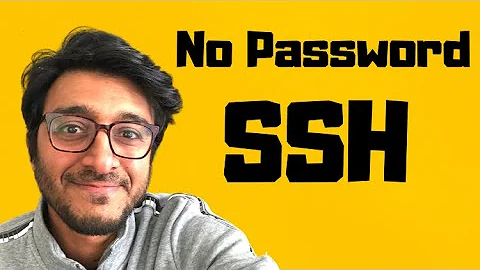How to setup password-less ssh with RSA keys
I found the source of the problem. There was a vague message in /var/log/messages about strange ownership that tipped me off. So I checked, and the permissions of /root, /root/.ssh, and /root/.ssh/* were all correct (700), but the ownership was default.default. I'm not sure how that happened... but I ran:
[root@box1:.ssh/$] chown root.root /root
[root@box1:.ssh/$] chown root.root /root/.ssh
[root@box1:.ssh/$] chown root.root /root/.ssh/*
To changed the ownership to root and passwordless login works in both directions.
Related videos on Youtube
linsek
Updated on September 18, 2022Comments
-
linsek over 1 year
I am trying to setup a password-less SSH configuration between two machines and I am having a problem. There are a ton of howtos out there that I have followed and have had no success. Here are the steps that I've taken
Generate the authentication keys on the client. (Pressed enter when prompted for a passphrase)
[root@box1:.ssh/$] ssh-keygen -t rsaCopy the public key to the server.
[root@box1:.ssh/$] scp id_rsa.pub root@box2:.ssh/authorized_keysVerified the authorized key was created successfully on the server
Executed the following command:
[root@box1:.ssh/$] ssh root@box2 ls
And I was still prompted for a password. I read a note on one howto that said "depending on the version of SSH that is running..." (although it did not specify which versions needed this), it might require:
- The public key in .ssh/authorized_keys2
- Permissions of .ssh to 700
- Permissions of .ssh/authorized_keys2 to 640
I also followed those steps and had no success. I have verified that the home, root, and .ssh directories are not writable by group (according to https://unix.stackexchange.com/tags/ssh/info).
Anyone have any ideas what I'm missing?
Thanks
EDIT: I also copied the public key to the second box using the ssh-copy-id command and that generated the
.ssh/authorized_keysfile.[root@box1:.ssh/$] ssh-copy-id -i id_rsa.pub root@box2EDIT2: Including version information
// box1 (system keys were generated on)
- Linux 2.6.34
- OpenSSH_5.5p1 Debian-6, OpenSSL 0.9.8o 01 June 2010
// box2
- Linux 2.6.33
- Dropbear client v0.52
EDIT3: Debug output
[root@box1:.ssh/$] ssh -vvv root@box2 ls OpenSSH_5.5p1 Debian-6, OpenSSL 0.9.8o 01 Jun 2010 debug1: Reading configuration data /etc/ssh/ssh_config debug1: Applying options for * debug2: ssh_connect: needpriv 0 debug1: Connecting to box2 [box2] port 22. debug1: Connection established. debug1: permanently_set_uid: 0/0 debug3: Not a RSA1 key file /root/.ssh/id_rsa. debug2: key_type_from_name: unknown key type '-----BEGIN' debug3: key_read: missing keytype debug3: key_read: missing whitespace debug2: key_type_from_name: unknown key type '-----END' debug3: key_read: missing keytype debug1: identity file /root/.ssh/id_rsa type 1 debug1: Checking blacklist file /usr/share/ssh/blacklist.RSA-2048 debug1: Checking blacklist file /etc/ssh/blacklist.RSA-2048 debug1: identity file /root/.ssh/id_rsa-cert type -1 debug1: identity file /root/.ssh/id_dsa type -1 debug1: identity file /root/.ssh/id_dsa-cert type -1 debug1: Remote protocol version 2.0, remote software version dropbear_0.52 debug1: no match: dropbear_0.52 debug1: Enabling compatibility mode for protocol 2.0 debug1: Local version string SSH-2.0-OpenSSH_5.5p1 Debian-6 debug2: fd 3 setting O_NONBLOCK debug1: SSH2_MSG_KEXINIT sent debug1: SSH2_MSG_KEXINIT received debug2: kex_parse_kexinit: diffie-hellman-group-exchange-sha256,diffie-hellman-group-exchange-sha1,diffie-hellman- group14-sha1,diffie-hellman-group1-sha1 debug2: kex_parse_kexinit: [email protected],[email protected],ssh-rsa,ssh-dss debug2: kex_parse_kexinit: aes128-ctr,aes192-ctr,aes256-ctr,arcfour256,arcfour128,aes128-cbc,3des-cbc,blowfish- cbc,cast128-cbc,aes192-cbc,aes256-cbc,arcfour,rijndael-cbc@lysatoe debug2: kex_parse_kexinit: aes128-ctr,aes192-ctr,aes256-ctr,arcfour256,arcfour128,aes128-cbc,3des-cbc,blowfish- cbc,cast128-cbc,aes192-cbc,aes256-cbc,arcfour,rijndael-cbc@lysatoe debug2: kex_parse_kexinit: hmac-md5,hmac-sha1,[email protected],hmac-ripemd160,[email protected],hmac- sha1-96,hmac-md5-96 debug2: kex_parse_kexinit: hmac-md5,hmac-sha1,[email protected],hmac-ripemd160,[email protected],hmac- sha1-96,hmac-md5-96 debug2: kex_parse_kexinit: none,[email protected],zlib debug2: kex_parse_kexinit: none,[email protected],zlib debug2: kex_parse_kexinit: debug2: kex_parse_kexinit: debug2: kex_parse_kexinit: first_kex_follows 0 debug2: kex_parse_kexinit: reserved 0 debug2: kex_parse_kexinit: diffie-hellman-group1-sha1 debug2: kex_parse_kexinit: ssh-rsa,ssh-dss debug2: kex_parse_kexinit: aes128-ctr,3des-ctr,aes256-ctr,aes128-cbc,3des-cbc,aes256-cbc,twofish256-cbc,twofish- cbc,twofish128-cbc,blowfish-cbc debug2: kex_parse_kexinit: aes128-ctr,3des-ctr,aes256-ctr,aes128-cbc,3des-cbc,aes256-cbc,twofish256-cbc,twofish- cbc,twofish128-cbc,blowfish-cbc debug2: kex_parse_kexinit: hmac-sha1-96,hmac-sha1,hmac-md5 debug2: kex_parse_kexinit: hmac-sha1-96,hmac-sha1,hmac-md5 debug2: kex_parse_kexinit: zlib,[email protected],none debug2: kex_parse_kexinit: zlib,[email protected],none debug2: kex_parse_kexinit: debug2: kex_parse_kexinit: debug2: kex_parse_kexinit: first_kex_follows 0 debug2: kex_parse_kexinit: reserved 0 debug2: mac_setup: found hmac-md5 debug1: kex: server->client aes128-ctr hmac-md5 none debug2: mac_setup: found hmac-md5 debug1: kex: client->server aes128-ctr hmac-md5 none debug2: dh_gen_key: priv key bits set: 132/256 debug2: bits set: 515/1024 debug1: sending SSH2_MSG_KEXDH_INIT debug1: expecting SSH2_MSG_KEXDH_REPLY debug3: check_host_in_hostfile: host 192.168.20.10 filename /root/.ssh/known_hosts debug3: check_host_in_hostfile: host 192.168.20.10 filename /root/.ssh/known_hosts debug3: check_host_in_hostfile: match line 3 debug1: Host 'box2' is known and matches the RSA host key. debug1: Found key in /root/.ssh/known_hosts:3 debug2: bits set: 522/1024 debug1: ssh_rsa_verify: signature correct debug2: kex_derive_keys debug2: set_newkeys: mode 1 debug1: SSH2_MSG_NEWKEYS sent debug1: expecting SSH2_MSG_NEWKEYS debug2: set_newkeys: mode 0 debug1: SSH2_MSG_NEWKEYS received debug1: Roaming not allowed by server debug1: SSH2_MSG_SERVICE_REQUEST sent debug2: service_accept: ssh-userauth debug1: SSH2_MSG_SERVICE_ACCEPT received debug2: key: /root/.ssh/id_rsa (0x54b1c340) debug2: key: /root/.ssh/id_dsa ((nil)) debug1: Authentications that can continue: publickey,password debug3: start over, passed a different list publickey,password debug3: preferred gssapi-keyex,gssapi-with-mic,publickey,keyboard-interactive,password debug3: authmethod_lookup publickey debug3: remaining preferred: keyboard-interactive,password debug3: authmethod_is_enabled publickey debug1: Next authentication method: publickey debug1: Offering public key: /root/.ssh/id_rsa debug3: send_pubkey_test debug2: we sent a publickey packet, wait for reply debug1: Authentications that can continue: publickey,password debug1: Trying private key: /root/.ssh/id_dsa debug3: no such identity: /root/.ssh/id_dsa debug2: we did not send a packet, disable method debug3: authmethod_lookup password debug3: remaining preferred: ,password debug3: authmethod_is_enabled password debug1: Next authentication method: passwordEDIT4: Another interesting development. Instead of generating the keys on box1 (running OpenSSH) and copying them to box2 (running dropbear) I did it in reverse:
[root@box2:.ssh/$] dropbearkey -t rsa -f id_rsa[root@box2:.ssh/$] dropbearkey -y -f id_rsa | grep "^ssh-rsa" >> authorized_keys[root@box2:.ssh/$] scp authorized_keys root@box1:.ssh/And with that I am successfully able to issue commands password-less from box2 to box1 ONLY if I specify the ID file:
[root@box2:.ssh/$] ssh -i id_rsa root@box1 lsStill unable to issue commands from box1 (OpenSSH) to box2 (dropbear).
-
Chad Huneycutt over 11 yearsWhat versions of ssh? What OS on box1 and box2? Is the ssh daemon configured to allow root logins on box2?
-
linsek over 11 years@ChadHuneycutt added in edit2
-
linsek over 11 yearsAlso added debug output as it might be insightful.
-
Chad Huneycutt over 11 yearsWhat kind of debug output does dropbear support? And did you check dropbear's configuration to see if it allows root public key logins?
-
 xrfang over 11 yearsSomeone with the same issue as you. Unfortunately, doesn't look like it got solved. :( serverfault.com/questions/299051/what-does-this-ssh-error-mean
xrfang over 11 yearsSomeone with the same issue as you. Unfortunately, doesn't look like it got solved. :( serverfault.com/questions/299051/what-does-this-ssh-error-mean -
 xrfang over 11 yearsSeems there's not much you haven't tried. My only suggestion: Here is a similar issue, where the fix was to specify protocol version 1 before generating the keys: lists.debian.org/debian-user/2003/02/msg01972.html
xrfang over 11 yearsSeems there's not much you haven't tried. My only suggestion: Here is a similar issue, where the fix was to specify protocol version 1 before generating the keys: lists.debian.org/debian-user/2003/02/msg01972.html -
 Gilles 'SO- stop being evil' over 11 yearsWhat options is the dropbear server started with? Does anything appear in the system logs on box2?
Gilles 'SO- stop being evil' over 11 yearsWhat options is the dropbear server started with? Does anything appear in the system logs on box2? -
linsek over 11 yearsadding edit4 solution for dropbear to openssh communication
-
linsek over 11 years@Gilles dropbear is started by the following:
start-stop-daemon -S -q -p /var/run/dropbear.pid --exec /usr/sbin/dropbear -
linsek over 11 years@ire_and_curses Very interesting post, thanks. I tried to limit it to protocol 1 and generate new keys for rsa1. Not only did that not work, but it also broke the dropbear configuration. So box2 returns
connection to root@box1 exited: Incompatible remote version 'SSH-1.5-OpenSSH_5.5p1 Debian6' -
Alessio over 11 yearsi'm guessing that box2 with dropbear is a router or some other small device rather than a general-purpose PC. is there any chance of upgrading the version of dropbear? 0.52 is quite old (Nov 2008), latest version is 2012.55 from Feb this year. alternatively is replacing dropbear with openssh a viable option?
-
Karlson over 11 years@njozwiak Have you tried running the
sshdin debug mode to see why it doesn't allow passthru authentication?
-
Chad Huneycutt over 11 yearsAccording to his step 1, his comment just above, and the ssh output, he did not set a passphrase and is being prompted for the password.
-
kumar over 11 yearsI think the
=is required before theroot@boxnwhich is just an identifier for the key. The remote machine will say something likeAuthenticated with public key "root@boxn"if it works. -
linsek over 11 years
=is not required as I have tested between two Linux boxes running OpenSSH and they both work without any=in the public keys. Additionally, it is working from dropbox to OpenSSH without a=in the file. -
kumar over 11 yearsin that case I am starting to agree with Ashwin: does Dropbear allow root login? - From the Dropbear manual "Dropbear will not let you log in as "root" without a password." - leaf.sourceforge.net/doc/bucu-dropbear.html
-
linsek over 11 yearsit is possible as I have one box that is currently doing it. "box1" in the question is a host computer and there are actually multiple "box2's". box2 is an embedded system running dropbear. I currently have 1/3 of these working fully (that is I am able to passwordlessly communicate from box1 to box2 and from box2 to box1). So it is possible, but I can't find a key or configuration difference between them.
-
linsek over 11 yearsI found an article explaining how to disable password login for root in dropbear by editing the
/etc/default/dropbearconfiguration file. But that file doesn't exist on my system. (source: cybermilitia.net/2009/02/28/dropbear-on-debian) -
Krzysztof Adamski over 11 yearsThis debug line is saying that id_rsa file on client machine is improperly formated, not authorized_keys on server machine. You should also run your dropbear on server machine in debug mode (use options -E and -F and run this from CLI, it should not go to background and log everything to stderr, you should see what is happening).
-
gabe. over 11 yearsYeah, almost always ssh key issues come down to permissions / ownership problems. Glad you go this sorted out.




